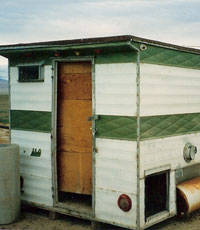

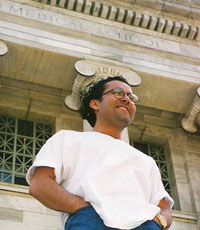
"Mentoring is a cornerstone—[it's] the reason I'm here today," says Dr. Alfredo Quiñones-Hinojosa, shown here outside Harvard Medical School. 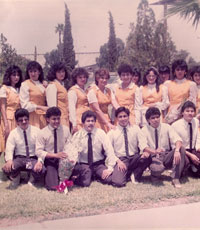
Before leaving Mexico, the future Dr. Q (first row, second from left) graduated from a local teaching college. 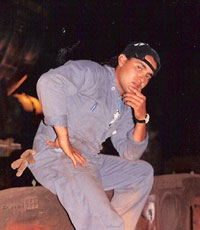
While taking English classes at a community college, Dr. Q worked as a welder for a railroad company. 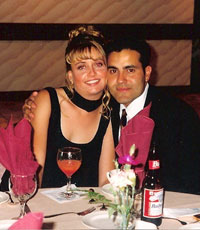
Four years after "jumping the fence" from Mexico, Dr. Q was awarded a scholarship to the University of California, Berkeley. In this photo, he poses with his future wife, Anna, at a graduation dinner. 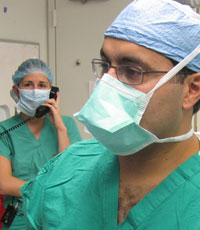
"In the moments I'm spending with [patients] in the operating room," says Dr. Q, "nothing else matters." |
Dr. Alfredo Quiñones-Hinojosa's first step towards becoming a renowned brain surgeon was more like a leap—at 19 years old, he hopped the border fence from Mexico to become a migrant farmworker in southern California. Gradually, he learned English, went back to school, and excelled, eventually winning scholarships to the University of California, Berkeley, and later to Harvard Medical School. In this interview, hear from "Dr. Q"—as his students call him—about his days as a farm laborer, his approach to medicine, his thoughts on mentoring young doctors, and more. A TOUGH STARTQ: On your CV, the first entry under "work experience" is migrant worker. Alfredo Quiñones-Hinojosa: Yes. Very few people notice that. The very first line in my CV is migrant farmworker. I put that on purpose. I'm proud of it. For many years, I relayed a story about when I was told that it couldn't be possible that I was that smart and I was Mexican. It really hurt me. For many, many years, I was embarrassed, to be honest with you, and I had to deal with that. And now I am proud of it. Q: What kind of work were you doing? Dr. Q: I was just doing anything that they would allow me to do. The very first job that I had was just to pull weeds and drive tractors and all this equipment that you used to labor the land. At first, I was thinking, "I am going to take over the world. I am going to go back to my country triumphant and making a lot of money." Then I got my first check, $3.75 an hour, about $130 a week, and I realized this may take a little bit longer, and this is hard work. Q: Why did you want to stay in the U.S. when faced with that kind of challenge? Dr. Q: I began to realize that I could not possibly go back to my country as a failure. So many generations of my relatives have come to the United States. None of them have gotten an education. I had got an education in Mexico, and I was here doing absolutely wonderful labor, but was never going to be able to move upwards in this country. I was going to stay stagnant, just like the rest of my family, and I just couldn't live with that harsh decree. But then I had an opportunity to go to community college and learn English. And that's how this whole thing sort of began to develop, by necessity, by chance, by opportunity, by having that dream, that determination, and that discipline. Things began to fall in place. Q: It certainly sounds like it—first a scholarship to Berkeley and then Harvard Medical School. But did your background affect the way you were treated by your professors and peers? Dr. Q: I think, as I look back to medical school, I remember that some of my professors thought that I would have a higher impact in my people if I pursued family practice or a different profession. That meant the minority population, the Hispanic population in the United States. So I was encouraged to pursue that, and I welcomed and thanked them for their advice. Q: But you stuck it out in neurosurgery anyway. Dr. Q: I know in my heart that this is a tough fight. I know that the chances that I may have a significant impact on the disease are not very good. To be honest with you, the odds are overwhelmingly against me succeeding in this field as far as finding a cure or a better way to treat brain cancer. But so were the chances of me sitting here with you today when I came to this country 20 years ago. So I cannot give up that dream. I cannot give up on the possibility that those patients who need us will one day benefit from the work that we're doing today. SCIENCE VS. SURGERYQ: So, why brain cancer? Dr. Q: You know, I feel that brain cancer is sort of the bastard child of neurosurgery. It's sort of the disease that most brain surgeons feel that there's absolutely nothing that we can do [about]. Right now, 50 percent of people with a malignant brain tumor will survive less than 15 months with our best treatment. If we can change that to make it a chronic disease and they can survive 17, 19, 20, 30 months, a year, three years, whatever that is, that's going to be a major accomplishment. Q: What kind of research are you doing in your laboratory to push closer to that goal? Dr. Q: What we're trying to understand in my laboratory is very simple. It's really not that complex. We're trying to understand how does brain cancer originate, one, and how does it spread, two. Now, I simplified, but the reality of the situation is that to get to the important aspects of those two questions, you really need a lot of researchers throughout the world to look at the same problem in a different way. Q: What's unique about your lab's approach? Dr. Q: We use the operating room as an extension of the laboratory. I have access to the human brain like no one else in the world, and I am privileged and lucky to have an incredible amount of interest in the disease. And I am privileged to have put together an incredible team of young scientists in my laboratory who help me achieve those goals, who help me carry on those experiments that I conceive based on the things that I see in the operating room and the tissue I collect there. Q: Are you getting closer to any new treatment? Dr. Q: Not even close. We're very much at the embryonic stages. But you can't give up. You've got to have faith. I may go through my whole life without being able to find a meaningful way to treat brain cancer. But if along the way I open doors for other [researchers] to come in and learn more about the human brain, if I open doors for my students to go on and pursue their own careers, if I can motivate them to continue to try to find better ways to study the human brain, I'll be absolutely thrilled. I will have a major accomplishment in my life. So you have to have that kind of faith and that kind of spirit that you will be able to one day find something. Q: Why is having faith in science important? Dr. Q: Well, it goes beyond science, to be honest with you. Even though I grew up very religious as a little kid, I have not practiced religion for many years, but I do recognize that we all have a purpose in our lives. And sometimes I wonder with all the knowledge that we have as human beings whether there are things that we may not have answers for, at least not within our lifetime. That's when I say you've got to have faith—you've got to believe that there's something beyond what you cannot see, that one day you may potentially see. So I have faith more than just in science. I have faith in humanity. And that to me is much more powerful than all the science that we do in the world.
Q: Which one are you more likely to stick with, the science or the surgery? Dr. Q: I would love to stay with both. I don't really think I have much of a choice, to be honest with you. For me to be happy, for me to be able to look at my patients in the face and tell them that I am doing everything possible within my power to try to find better ways to treat them—and if not them, our future generations, our children, our grandchildren—I cannot possibly be happy doing one without the other. I think they are complementary. IN THE OPERATING ROOMQ: What do you do to prepare mentally before you perform an operation? Dr. Q: That operation has already taken place in my mind many, many times, if not hundreds of times. I have conceived what things could potentially happen in the operating room. What corridor am I going to approach this tumor? What am I going to find? What blood vessel? What special structure is going to come in front of me as I navigate this very complex organ which is the brain? What kind of things can possibly go wrong when I am in there with my hands into this human being who has trusted me with his or her life? At that moment I know that I am the man for the job, and I have no doubt in my heart and in my brain. And I promised to myself and to them that I was going to take care of them, so there's no room for hesitation. Q: Brain surgery has some inherent risks, of course. How do you prepare your patients for everything that could potentially happen on the operating table? Dr. Q: I meet them the day of surgery or the day before surgery, in many cases both of them, and we talk about what we're going to do in the operating room. That's a very scary moment because I tell them every single horrible thing that can happen. It's extremely scary both for them and for me, and I continuously tell them everything that can happen just to humble myself, to realize that it doesn't matter how much we try to control a situation, there's always a human element that we just cannot predict. That is obviously a powerful moment. The day of surgery is another special moment, that morning before we walk into the operating room when I tell them that I cannot promise them that I'm going to get them out of the operating room alive. The one thing I can promise them is that I'm going to do everything within my power to take care of them. And in that moment that I am spending with them in the operating room, nothing else matters. It's just them and me. That's it. And then we walk into the operating theater. Q: Do you think performing such a delicate operation gives you a closer bond to your patients? Dr. Q: I like to think about the operating room as a continuum of a relationship that I establish with a patient. And that relationship that I establish with the patient starts the moment I meet them. That is a very special moment, when I look at them in the eye and you can tell right away, or at least I can tell right away, to some extent how much pain and suffering they are having just by their facial expressions, by the way they relate to me, by the way they talk to me. That relationship starts right there. Q: You really seem to love this work. Dr. Q: I do, actually. I really do. I remember the first time that I saw the brain exposed, the first time that I saw that organ as magnificent as you have seen it in the operating room, the first time that I realized the intimate relationship that exists between a patient and a physician. And I mean a physician, not a surgeon, but a physician who happens to be a surgeon in the operating room. That intimate moment cannot be compared to and cannot be equaled by any other profession in the world. I feel guilty sometimes that I get an incredible amount of adrenaline rush by doing this. I mean, it doesn't get more complex than this, and I just thrive on it. There's that fear, that feeling of knowing that to some extent you're not in control. You're trying to bring order into a situation that can at any point explode and become chaotic, and then things can take a turn for the worse. TEACHING THE NEXT GENERATIONQ: Why is mentoring new students so important to you? Dr. Q: I think mentoring is a cornerstone. Mentoring is the reason why I am here today. I have to recognize that I may never be able to have a significant impact on brain cancer, so my duty is to train those future generations. Within those young minds, there are a lot of diamonds, a lot of rough diamonds, and my role is to polish them. My role is to cut them a certain way to help them unleash their full potential. Q: How many of those future "diamonds" do you think will come from a background similar to your own? Dr. Q: I know that among many other migrant farmworkers, there are a lot of brilliant young minds that, if given the opportunity, can [make] potentially significant contributions to humanity. Not just among the migrant farmworkers, but also among the kids that are running the inner city that don't have books to read, that don't have the privilege of an education. They don't have the role models. We pay a lot more attention to our athletes, to our movie stars, to our singers, which deservedly are wonderful. However, there are so many other people in the background. There are incredible teachers, architects, physicians. There are janitors or plumbers who are [making] a wonderful contribution to our society, but we just do not pay attention to them. Q: What are the chances of someone becoming a brain surgeon if they really put their mind to it? Dr. Q: I think that the chances of becoming a brain surgeon, for instance, are much better than the chances are of becoming a famous NBA superstar basketball player such as Michael Jordan or Kobe Bryant, or a famous movie star like Brad Pitt, or a famous singer. Number-wise you have better odds of getting into residency for neurosurgery and graduating as a brain surgeon at the end of seven years than you have of joining the NBA and becoming a successful NBA player. Just numbers. Q: What advice do you give young people today? Dr.
Q: I had no idea where my life
was going to lead. I just knew—as I tell young people who are at the
stage today which I was back then—that it is okay sometimes not to know
where you're going to end up. What is not okay is not to give your best at the
present. And I always knew that if I gave my best, things were going to one day
turn around.
|
“I have faith in more than just science. I have faith in humanity.” “I know that among many other migrant farmworkers, there are a lot of brilliant young minds that can have significant contributions to humanity.” “It is okay sometimes not to know where you're going to end up. What is not okay is not to give your best at the present.” |
|||||||||
|
Interview conducted in October 2007 by Robe Imbriano, producer of the NOVA scienceNOW segment "Profile: Alfredo Quiñones-Hinojosa," and edited by David Levin, assistant editor of NOVA online |
|||||||||||
|
© | Created July 2008 |
|||||||||||
